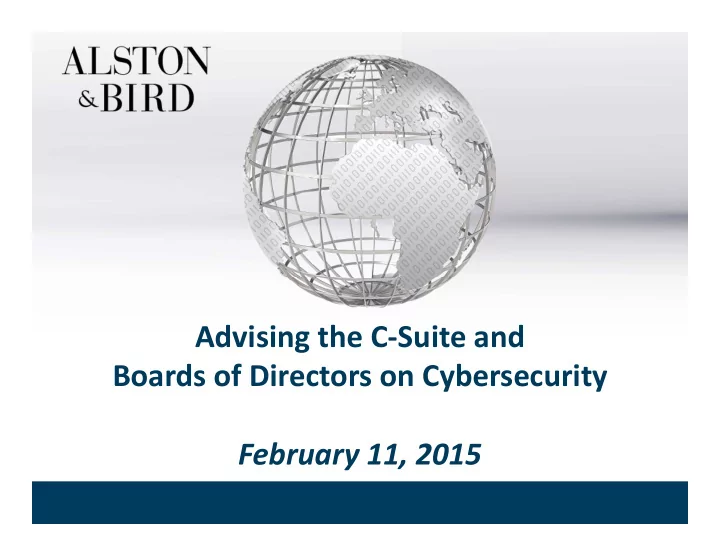

Advising the C-Suite and Boards of Directors on Cybersecurity February 11, 2015
Agenda Introductions / Administrative Cybersecurity risk legal landscape Cyber threats Legal risks in the aftermath of a breach The role of the board in cybersecurity Board duties Shareholder demands and derivative actions Cyber risk oversight – best practice guidance and regulator’s view Cyber breach response Follow us: @AlstonPrivacy 2 www.AlstonPrivacy.com
Presenters Jessica Corley Scott Ortwein Kim Peretti Jim Harvey Partner Partner Partner Partner Securities Litigation Corporate Transactions Privacy & Data Security Privacy & Data Security Moderator Follow us: @AlstonPrivacy 3 www.AlstonPrivacy.com
The Cyber Threat Landscape From Exploitation to Disruption to Destruction Follow us: @AlstonPrivacy 4 www.AlstonPrivacy.com
Fluid Dynamics of Cyber Risk Increasingly hard to keep breaches private irrespective of legal obligations (or control the disclosure). Shift from smash-and-grab to deep and prolonged access. Investigations produce uncertain results, increasing risk exposure. Detection can occur months or years after initial compromise. Evidence often not available, leaving victims unable to “prove the negative.” Risks: Reputational Regulatory Litigation Payment Cards Follow us: @AlstonPrivacy 5 www.AlstonPrivacy.com
Board Duties Regarding Cybersecurity Cybersecurity is becoming a priority issue for boards due to large number of breaches and extensive press activity. State law governs the board’s duties. Assume Delaware law for purposes of this presentation. Directors: Do not have to become experts on cybersecurity, and Are permitted (and expected) to rely on information and reports from management and others regarding cybersecurity and cyber risk. The Board should: Inform itself regarding cybersecurity risk, Be comfortable that the company has appropriate controls in place to manage that risk, and Monitor controls periodically to ensure that they are functioning as intended and that issues are being identified and addressed. Follow us: @AlstonPrivacy 6 www.AlstonPrivacy.com
Practical Metrics for Board Reporting and Cyber Issues How frequently does the Board receive reports on cybersecurity and cyber risk? What reporting on cyber issues has occurred in the last twelve months? Do the reports go to: The full Board? The Audit Committee? The Risk Committee? Who reports? How? In what form? Incident Readiness and Planning Threat Intelligence Cyber Security Governance Internal and External Controls Minutes of the Board or Committee Meetings? Appropriate detail Follow us: @AlstonPrivacy 7 www.AlstonPrivacy.com
The SEC is Focused on Boards and Cybersecurity Follow us: @AlstonPrivacy 8 www.AlstonPrivacy.com
Third Party Guidance on Boards and Cyber Risk Follow us: @AlstonPrivacy 9 www.AlstonPrivacy.com
Beware – Section 220 Demands Follow us: @AlstonPrivacy 10 www.AlstonPrivacy.com
Section 220 Demands (cont.) It is common to receive demands for investigation and books and records by shareholders in the post breach context. Investigation Shareholder will demand that the board investigate the breach and take action against any wrongdoers. Board hires counsel to conduct investigation. Books and Records Entitled to receive board materials related to cybersecurity and independence of the members of the board. Will negotiate a non-disclosure agreement before producing documents. Shareholder will either (1) go away, (2) file a lawsuit demanding additional materials, or (3) file a derivative lawsuit. Follow us: @AlstonPrivacy 11 www.AlstonPrivacy.com
Shareholder Derivative Suits Follow us: @AlstonPrivacy 12 www.AlstonPrivacy.com
Recent Shareholder Derivative Litigation Typical allegations against officers and directors in derivative litigation: Breach of the duty of loyalty and care, Wasted corporate assets, and Were unjustly enriched by the compensation they received while breaching their fiduciary duties. Cannot prevent these lawsuits, but best defense is: Regular reporting and review of controls, Appropriate governance, and Confirmation by the Board that the organization is staying abreast of evolving threats and adjusting its security posture accordingly. Very early in the life cycle of these cases – final resolution is difficult to predict today. Follow us: @AlstonPrivacy 13 www.AlstonPrivacy.com
Wyndham Litigation / Conflicts of Interest Follow us: @AlstonPrivacy 14 www.AlstonPrivacy.com
Preventive Maintenance – Disclosure? Follow us: @AlstonPrivacy 15 www.AlstonPrivacy.com
D&O Insurance? Follow us: @AlstonPrivacy 16 www.AlstonPrivacy.com
Cybersecurity Insurance? Follow us: @AlstonPrivacy 17 www.AlstonPrivacy.com
Advising the Board During a Breach Board must gain understanding of the scope of the breach and the business and legal implications of the breach. Board involvement: Board members must become informed. Consider using a committee for daily or more regular communication (refer to incident response plan). Consider having third-party engaged in the investigation or remediation speak directly to the board or Risk Committee. Oversee management’s decisions and responses. May include receiving reports on the action plan such as response times, appointment of “breach czar,” and action plan testing, as well as reports on containment and remediation plans. Follow us: @AlstonPrivacy 18 www.AlstonPrivacy.com
Questions? Follow us: @AlstonPrivacy www.AlstonPrivacy.com Follow us: @AlstonPrivacy 19 www.AlstonPrivacy.com
Recommend
More recommend